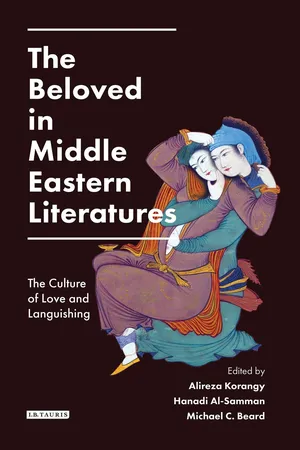![]()
![]()
Furūgh Farrukhzād’s conception and treatment of the beloved evolves only gradually through the five volumes of her poetry.1 Her publication of Asīr in 1955 made it clear that a new voice on the subject had emerged: a feminine, autobiographical voice, unique in over a thousand years of Iranian literary tradition.2 Initially conflicted, it would develop parallel to the poet’s perception of the beloved for the rest of her life.
The same year she published Asīr, Farrukhzād left her husband and child to become a poet in Tehran. The agony and confusion of the decision are clear in “Khāna-yi Matrūk”:
In depicting what she has left behind in order to pursue her life and her identity as a poet, she speaks of poetry as a lover.5 Farrukhzād wrote often on love and various beloveds, and these poems tend to reflect her then-current view of the world and her place in it. In “Khāna-yi Matrūk,” the speaker is suffering, but she has hope and a goal. She is no longer the prisoner of the collection’s title. She’s confused, ashamed, defiant, but resolute; she knows she has to find a way to write, and by extension, to love.
Asīr, along with Farrukhzād’s next two collections, Dīvār in 1956 and ‘Uṣyān-i Khudā in 1958, established her as an individual voice, making her anguish and her exultation heard during the process of her self-definition as woman and poet, frequently in the context of a love relationship. Her poems suggest that she wasn’t entirely sure of her identity at this point in her life, but they assign value to her existence as a person independent of any other, with “Pāsukh” from Dīvār, for example, reflecting an increasing sense that love justifies unconventional decisions that benefit an individual and not society. A speaker tells her lover:
In the summer of 1958, Farrukhzād began working for Gulistān Studios. She and her employer, Ibrāhīm Gulistān, began a relationship that was to last until her death, which contributed to the disapproval she encountered from Tehranians. Since Gulistān was married, with children, his time and attention were divided. This may have intensified the isolation that Farrukhzād describes in such later poems as “Vahm-i Sabz” and “Tavalludī Dīgar.”
The relationship certainly did nothing to reduce the conflict between Farrukhzād and the critics of her personal life, but Michael Hillmann writes that at this stage of her life (1958 onward), she had reached a “personal resolution of conflicts … between societal expectations and her own predilections. The die was cast, and she was set on living as a poet answerable as an individual to her own personal ethics.”7
“Fatḥ-i Bāgh” and “Maʿshūq-i Man” demonstrate this self-confidence, with the speakers betraying none of the doubt and shame of earlier stages. As both a poet and an unconventional woman, Farrukhzād stands secure at this point, if not always happy.
In “Fatḥ-i Bāgh,” the speaker achieves emotional independence through her commitment to an extramarital beloved; although she is acutely aware of society’s disapproval, the poem makes clear that it is essentially irrelevant. The opening immediately establishes the alienation between the speaker and her beloved on one hand, and society on the other:
Outside the city, the couple sees a crow fly rather threateningly over their heads, hurrying toward the city to carry gossip of the lovers.9 As Hillmann notes, “this gossip-mongering is not without danger, either, since the poet compares the crow’s voice to ‘a short spear.’”10 Although the speaker understands the situation, she does not seem to be troubled by it:
Once again, the Farrukhzād speaker places herself in direct confrontation with a disapproving society, with the crow broadcasting ill will like a gossip. But here the speaker’s tone is serene as she describes the first of many contrasts between herself and her lover in nature and society within the city walls: people in the city fear to step outside of convention and into joy (the garden), while the speaker and her lover boldly, unashamedly “pick the apple.”
The context of the action further separates the pair from those outside the garden. The stanza before tells us that people are gossiping about the lovers. Then there is the repeated statement that “everyone knows” about what they have done, which by this time is obviously something significantly outside the bounds of what this society considers acceptable. Immediately after, the speaker says that “everyone is afraid,” except for herself and her lover. The plucking of the apple marks the beginning of a process of increasing self-awareness for the lovers in their exploration of the garden, that larger world outside the figuratively closed windows and doors of the city.
The lovers begin their journey in the city, still within the boundaries of society. Although their window there is cold and forbidding, it still serves as the opening from which they see the ideal, alternative garden. In life, Farrukhzād would pay for venturing into this garden with the loss of her son and in the criticism she faced from Iranian society. Poems such as “Paranda Murdanīst” reflect her feelings of loneliness and isolation, even of despair. But in “Fatḥ-i Bāgh,” the speaker and her lover have just entered a metaphorical Eden of independent thought. While she is obviously conscious of society’s disapproval, she hardly concerns herself with it, other than to express a mild contempt for a way of life that precludes the joy she has discovered:
Although specifying that she and her lover are not married (their names aren’t linked in any registry of marriage),12 she describes the significance of their sexual relationship with relish. It represents something more genuine than society’s approved unions, as her contemptuous references to a “flimsy linking of two names” and “embracing in the old pages of a register” make clear. She and her lover revel in their glowing nakedness, but unlike Adam and Eve they continue to enjoy Eden. After entering this new world, they ask the advice of its natives:
...